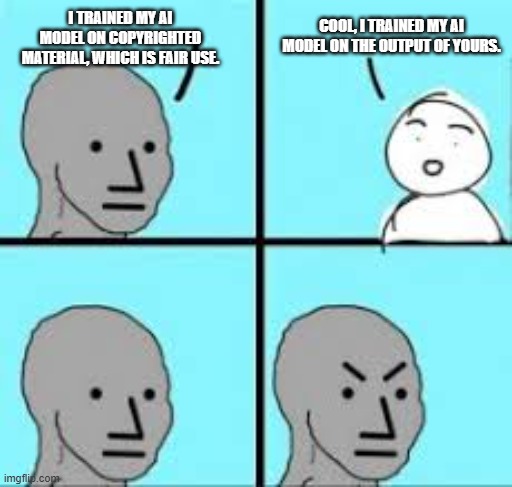Artists release silent album in protest against AI using their work
25 February 2025
Getty Images / Shutterstock
(Left to right) Annie Lennox, Kate Bush and Damon Albarn have all backed the silent album protest
More than 1,000 musicians - including Annie Lennox, Damon Albarn and Kate Bush - released a silent album on Tuesday in protest at the UK government's planned changes to copyright law, which they say would make it easier for AI companies to train models using copyrighted work without a licence.
Under the new proposals, AI developers will be able to use creators' content on the internet to help develop their models, unless the rights holders elect to "opt out".
The artists hope the album, entitled Is This What We Want?, will draw attention to the potential impact on livelihoods and the UK music industry.
All profits will be donated to the charity Help Musicians.
"In the music of the future, will our voices go unheard?" Kate Bush said in a statement.
A public consultation on the legal changes closes later on Tuesday.
The album - also backed by the likes of Billy Ocean, Ed O'Brien of Radiohead and Bastille's Dan Smith, as well as The Clash, Mystery Jets and Jamiroquai - features sound recordings of empty studios and performance spaces, demonstrating what the artists fear is the potential impact of the proposed law change.
The tracklisting for the record simply spells out the message: "The British government must not legalise music theft to benefit AI companies."
Various Artists - The tracklisting on the back cover of the album by Various Artists carries a message
The government is currently consulting on proposals that would allow AI companies to use material that is available online without respecting copyright if they are using it for text or data mining.
Generative AI programmes mine, or learn, from vast amounts of data like text, images, or music online to generate new content which feels like it has been made by a human.
The proposals would give artists or creators a so-called "rights reservation" – the ability to opt out.
But critics of the plan believe it is not possible for an individual writer or artist to notify thousands of different AI service providers that they do not want their content used in that way, or to monitor what has happened to their work across the whole internet.
A spokesman for the Department for Science, Innovation and Technology (DSIT) said in a statement on Tuesday that the UK's "current regime for copyright and AI is holding back the creative industries, media and AI sector from realising their full potential - and that cannot continue".
"That's why we have been consulting on a new approach that protects the interests of both AI developers and right holders and delivers a solution which allows both to thrive.
"We have engaged extensively with these sectors throughout and will continue to do so."
They added that "no decisions have been taken" and "no moves will be made until we are absolutely confident we have a practical plan that delivers each of our objectives."
'Disastrous for musicians'
Imogen Heap, Yusuf aka Cat Stevens and Riz Ahmed have also backed the silent album release as well as Tori Amos and Hans Zimmer.
Composer Max Richter, another of the artists involved in the album, noted how the plans not only have an impact on musicians but "impoverish creators" across the board, from writers to visual artists and beyond.
In 2023,
UK music contributed a record £7.6 billion to the economy.
Organiser of the silent record, Ed Newton-Rex, said the proposals were not only "disastrous for musicians" in the UK but also "totally unnecessary", as the country can be "leaders in AI without throwing our world-leading creative industries under the bus".
He said the new record showed that "however the government tries to justify it, musicians themselves are united in their thorough condemnation of this ill-thought-through plan."
Singer-songwriter Naomi Kimpenu added: "We cannot be abandoned by the government and have our work stolen for the profit of big tech."
She said the plans would "shatter the prospects of so many emerging artists in the UK".
Tuesday's national newspapers carried a wrap-around advert for the Make It Fair Campaign
In January,
Sir Paul McCartney told the BBC the proposed changes to copyright law could allow "rip off" technology that might make it impossible for musicians and artists to make a living.
In
a letter to The Times, published on Monday, signatories including Sir Paul, Lord Lloyd Webber and Sir Stephen Fry said that changes to the law will allow big tech to raid the creative sectors.
They were joined by the likes of Bush, Ed Sheeran, Dua Lipa and Sting in opposing plans to change copyright laws.
On Tuesday, the UK's creative industries launched a campaign to highlight how their content is at risk of being given away for free to AI firms.
The Make it Fair campaign, which includes wrap-around adverts in national newspapers, is urging people to write to their MPs to object to the government's plans.











